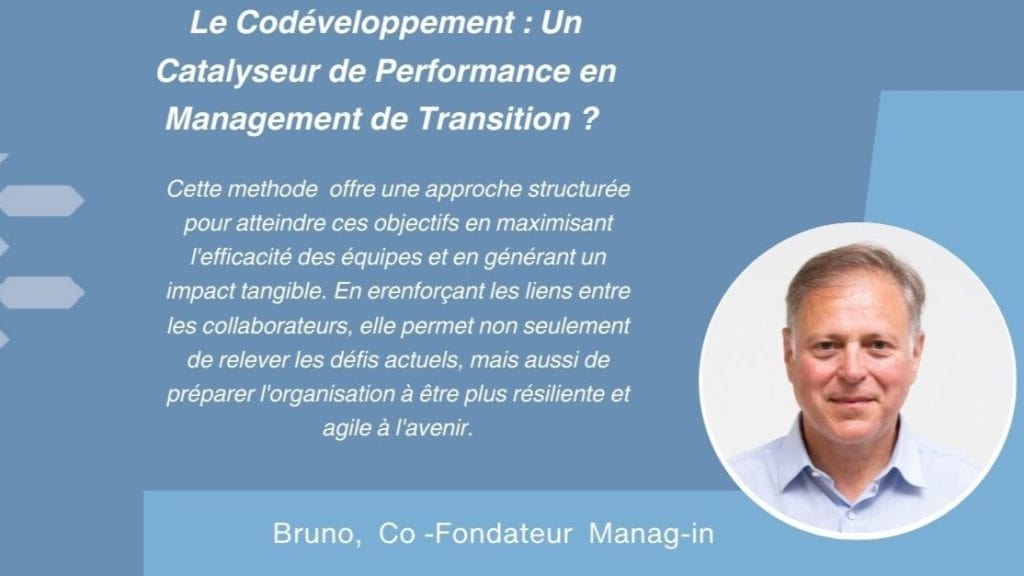
Co-development and Interim Management: A Winning Duo for Performance
Interim management requires leaders who can adapt quickly, make informed decisions, and mobilize teams to solve complex challenges. In this context, co-development is emerging as an essential strategic approach, making it possible to channel collective intelligence in a structured and effective way. This is how co-development, when integrated into interim management missions, makes it possible to generate concrete and sustainable results.
Co-development: a structured process
Co-development is a collective support process based on collective intelligence, with well-defined roles. Each session is organized around three essential roles: the client (who presents a concrete case), the consultants (who bring their perspectives) and the facilitator (who facilitates exchanges). This iterative process allows for pragmatic progress while meeting the real needs of the participants. The co-development group focuses on concrete cases, provided by the participants, in a benevolent but structured framework, guaranteeing tangible results.
Accelerate Decision-Making
: Co-development reduces red tape by encouraging collective decision-making. In an interim management mission, this dynamic is particularly useful for dealing with complex situations where time is limited. By sharing varied perspectives, the group quickly identifies the most viable options, allowing the interim manager to make informed decisions and mobilize teams with a clear roadmap. This approach reduces excessive bureaucracy while promoting thoughtful, shared, and transparent decisions.
Engaging Teams in Problem Solving
: Co-development is a powerful lever for directly involving teams in problem solving. Rather than resorting to micromanagement, it encourages frank and direct exchanges, allowing each member to bring their unique perspective. During a transition mission, team engagement is key to avoiding resistance to change. Co-development gives a voice to each employee, valuing their ideas and expertise, which makes it possible to adopt concrete solutions adapted to the field and to maintain a strategic alignment around essential priorities.
Fostering an Action-Oriented Environment of Trust
: Trust is a fundamental prerequisite for collective effectiveness. Co-development helps build an environment where everyone feels free to express their ideas, while keeping a clear focus on solving problems. In the context of an interim management mission, this trust is crucial to accelerate the acceptance of changes and encourage individual initiatives. By eliminating sterile debates, the group focuses on achieving concrete results, creating a more proactive and engaged team dynamic.
Driving Innovation Through Collaboration
: Co-development workshops are platforms for collective innovation where participants can experiment, exchange and formalize new ideas. The collaborative framework allows concepts to be tested and quickly transformed into concrete actions. During an interim management mission, the manager can use these workshops to discover new approaches to the problems encountered. By confronting points of view, the group generates innovative solutions that address the specific challenges of the organization, thus ensuring a sustainable competitive advantage.
Developing Skills with a Focus on Efficiency
: Co-development facilitates the development of individual and collective skills in a targeted manner. In a transition mission, it is common for skills to be developed quickly to meet the needs of the moment. Rather than following long theoretical training courses, the co-development approach is based on concrete and immediate actions, adapted to the real needs of the teams. This method reinforces the autonomy of employees, allowing them to effectively meet challenges and gain confidence, while creating a dynamic of collective skills development.
A Cultural Transformation at the Service of Performance
Interim management aims for a rapid and thoughtful transformation, far from administrative burdens and routine habits. Co-development offers a structured approach to achieving these goals by maximizing team effectiveness and generating tangible impact. This method, by strengthening the bonds between employees, not only makes it possible to meet current challenges, but also to prepare the organization to be more resilient and agile in the future.
For those looking for effective strategies to transform their organization, co-development represents a promising path. Its benefits are manifested through concrete results, increased commitment, and a culture of sustainable collaboration.
What practices have you put in place to get to the heart of the matter and transform your organization? The exchange around these approaches is always a source of richness and learning


